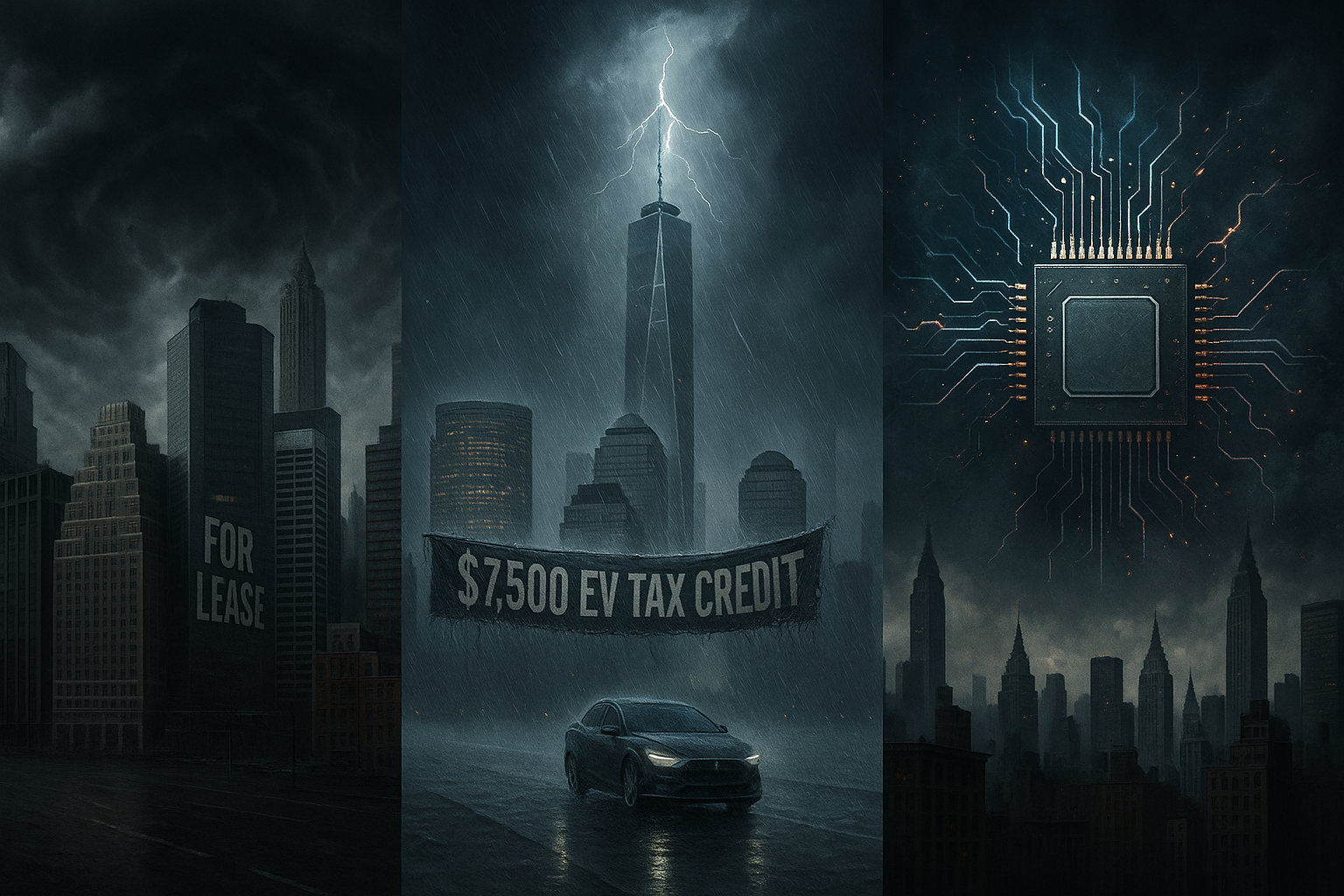The stock market hates surprises. But sometimes, the most dangerous threats aren't surprises at all—they're the obvious dangers we collectively decide to ignore until it's too late.
Right now, three major problems are converging like storm fronts on the financial horizon. And Wall Street's reaction? A collective shrug that would make even the most jaded New Yorker proud.
Commercial Real Estate: The Silent Killer
If you want to see genuine panic in a banker's eyes these days, just whisper the words "office building loans" and watch what happens.
Office delinquency rates have now climbed to a staggering 11.7%—worse than the 10.7% peak we saw during the 2008 financial crisis. Let that sink in for a moment. We're in territory that makes the Great Recession look like a minor hiccup.
Multifamily properties aren't doing much better, with delinquency rates hitting 6.9%. Having covered commercial real estate markets since the pandemic began, I can tell you this isn't just a cyclical downturn—it's structural.
The weird thing? Hardly anyone's talking about it. It's like we've all agreed to pretend this massive problem doesn't exist. (Spoiler alert: ignoring financial crises rarely makes them disappear.)
EVs: The Incentive Cliff Approaches
Meanwhile, the auto industry is about to learn a harsh lesson about artificial demand.
Those juicy federal tax credits—$7,500 for new electric vehicles and $4,000 for used ones—vanish like morning mist on September 30th. And surprise, surprise... sales are booming right now.
July saw a record 37,000 used EVs change hands. Great news, right? Well, not exactly. This isn't organic growth; it's demand pulled forward. Consumers who might have bought in October, November, or December are rushing to beat the deadline.
Look, we've seen this movie before. Remember Cash for Clunkers back in 2009? Sales spiked, everyone celebrated, and then—crash. The difference now is that automakers have bet billions on the EV transition. Ford, GM, VW... they've all pushed their chips to the center of the table.
What happens in October when that artificial demand evaporates? I've spoken with several dealership owners who are already bracing for impact.
AI: The Emperor's New Algorithms
And then there's AI—the magical technological fairy dust that was supposed to transform everything.
Even Nvidia—the poster child of the AI boom—is showing signs of slowing growth, dropping from 69% year-over-year to "just" 53%. Still impressive? Sure. But in the momentum-driven tech sector, direction matters more than absolute numbers.
More troubling is an MIT study finding that a whopping 95% of AI projects fail to deliver results. Yet somehow, NVIDIA still commands a forward P/E ratio around 45x. That's not just expensive; that's "dotcom bubble" expensive.
The smart money? They're already heading for the exits, quietly offloading shares to retail investors who are still star-struck by AI's promises. It's a time-honored Wall Street tradition—pump up the narrative, then dump the stock before reality sets in.
When Problems Collide
What makes this situation particularly dangerous isn't any single issue—it's how they might interact.
Commercial real estate woes will inevitably strain bank balance sheets. Exactly when will banks need financial flexibility? When the auto sector comes begging for help after EV sales crater. And just when we might need tech stocks to prop up market sentiment? That's precisely when the AI narrative could implode.
It's like watching three separate fuses burn toward a common powder keg.
The current market isn't "consolidating gains" or "digesting recent advances." That's analyst-speak for "we have no idea what's happening but don't want to sound alarmed."
No, this market reminds me of a boxer who's taken too many hits but remains upright through sheer muscle memory. The legs are wobbly, but the crowd hasn't noticed yet.
From September through year-end, don't be surprised if the market path bends decidedly southward—particularly for banks, automakers, and those high-flying tech names everyone thinks can only go up.
Can something save us? Maybe. Markets are unpredictable beasts, and sometimes rescue arrives from unexpected quarters. But based on what I'm seeing... well, I wouldn't bet my 401(k) on it.
Sometimes the wisest investment move is taking your chips off the table when everyone else is still ordering drinks. This might be one of those times.
